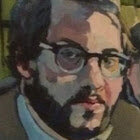This article has had a lot of attention paid to it recently, and I finally read it today while sitting in the waiting room of a medical clinic in St. Paul. I liked a few things about it, while I found others quite bothersome.
As a sort of cultural history, I think it’s really interesting if for no other reason because it confirms my thesis that Radiohead’s Kid A is the end of the musical twentieth century: the twenty-first begins—simultaneously—with 9/11 and the Strokes’ Is This It?.*
At the same time, though, Beck makes a(n admittedly sincere) rhetorical flaw when he writes:
A pretty good example of this kind of indie rock fan is me. In the two years since I graduated from college, I’ve had a pretty good time being “broke” in New York and drinking “cheap” beer with my friends. But sometimes I remind myself that the beer I’m drinking is not actually cheap, and that furthermore I am not actually broke: if I married someone who made the same salary I make, our household income would be slightly above the national median, which is also true of almost every person I spend my free time with. The truth is that I inherited expensive tastes and moved to an expensive city, and sometimes I get cranky about not being able to buy what I want. But when I don’t feel like reminding myself of these things, I can listen to indie music.
He goes on to take stabs at both Sufjan Stevens and M.I.A. (who both deserve stabs, I acquiesce, and not of the metaphorical variety) which makes me wonder if all of this isn’t just reactionary bullshit, and that Beck isn’t just waxing nostalgic for a culture that he was never a part of: Pitchfork’s “edenic era” (1995-1999), when slackers were still cool, zines still existed, and the Internet hadn’t ruined all of our fun by making everything corporate and cynical.**
Finally, what the fuck does he mean by, “we need new musical forms”? Does he know what he means by that? I don’t believe that he does. I think that there are plenty of musicians—within and without the indie rock milieu—who are currently experimenting with “new musical forms” in significant ways. But I have no idea if what I consider to be a “new musical form” at all resembles that which he demands at the end of the essay, because he doesn’t say another word about it, except to ask for “musicians who know that music can take inspiration not only from other music but from the whole experience of life,” as if he were Walter Fucking Benjamin.
I’m pretty sure, though, that if he were able to somehow articulate what it means to create a “new musical form” in the twenty-first century, and that if some musician or band were able to live up to this criteria in the form (no pun intended) of a record, Pitchfork would give that record a “10.0” review—or at least, somewhere in the nines.
*Chuck Klosterman makes a similar argument in Killing Yourself to Live. In fact, I should probably give him full credit and admit that my “thesis” is only a slight elaboration of his idea. It was in the eighteenth century, André Bazin writes, “when the notion of plagiarism appeared for the first time.”
**This happened long before the Internet.
